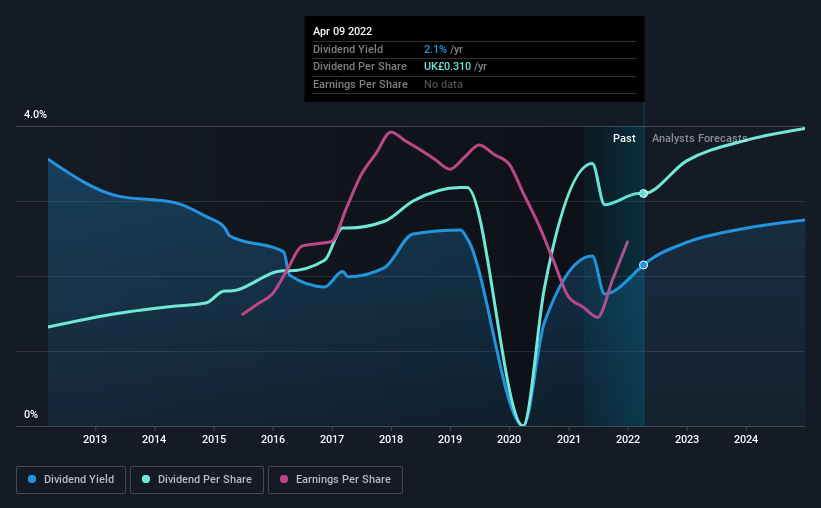- United Kingdom
- /
- Metals and Mining
- /
- LSE:HILS
Hill & Smith Holdings (LON:HILS) Is Increasing Its Dividend To UK£0.19

Hill & Smith Holdings PLC (LON:HILS) has announced that it will be increasing its dividend on the 8th of July to UK£0.19. Although the dividend is now higher, the yield is only 2.1%, which is below the industry average.
See our latest analysis for Hill & Smith Holdings
Hill & Smith Holdings' Payment Has Solid Earnings Coverage
Even a low dividend yield can be attractive if it is sustained for years on end. Before this announcement, Hill & Smith Holdings was paying out 72% of earnings, but a comparatively small 53% of free cash flows. Since the dividend is just paying out cash to shareholders, we care more about the cash payout ratio from which we can see plenty is being left over for reinvestment in the business.
Looking forward, earnings per share is forecast to rise by 78.1% over the next year. If the dividend continues on this path, the payout ratio could be 41% by next year, which we think can be pretty sustainable going forward.

Dividend Volatility
The company's dividend history has been marked by instability, with at least 1 cut in the last 10 years. Since 2012, the dividend has gone from UK£0.13 to UK£0.31. This implies that the company grew its distributions at a yearly rate of about 8.9% over that duration. It's good to see the dividend growing at a decent rate, but the dividend has been cut at least once in the past. Hill & Smith Holdings might have put its house in order since then, but we remain cautious.
Hill & Smith Holdings May Find It Hard To Grow The Dividend
With a relatively unstable dividend, it's even more important to see if earnings per share is growing. However, Hill & Smith Holdings' EPS was effectively flat over the past five years, which could stop the company from paying more every year.
Our Thoughts On Hill & Smith Holdings' Dividend
Overall, we always like to see the dividend being raised, but we don't think Hill & Smith Holdings will make a great income stock. The company is generating plenty of cash, which could maintain the dividend for a while, but the track record hasn't been great. We would probably look elsewhere for an income investment.
Investors generally tend to favour companies with a consistent, stable dividend policy as opposed to those operating an irregular one. Meanwhile, despite the importance of dividend payments, they are not the only factors our readers should know when assessing a company. For example, we've picked out 3 warning signs for Hill & Smith Holdings that investors should know about before committing capital to this stock. Looking for more high-yielding dividend ideas? Try our collection of strong dividend payers.
Valuation is complex, but we're here to simplify it.
Discover if Hill & Smith might be undervalued or overvalued with our detailed analysis, featuring fair value estimates, potential risks, dividends, insider trades, and its financial condition.
Access Free AnalysisHave feedback on this article? Concerned about the content? Get in touch with us directly. Alternatively, email editorial-team (at) simplywallst.com.
This article by Simply Wall St is general in nature. We provide commentary based on historical data and analyst forecasts only using an unbiased methodology and our articles are not intended to be financial advice. It does not constitute a recommendation to buy or sell any stock, and does not take account of your objectives, or your financial situation. We aim to bring you long-term focused analysis driven by fundamental data. Note that our analysis may not factor in the latest price-sensitive company announcements or qualitative material. Simply Wall St has no position in any stocks mentioned.
About LSE:HILS
Hill & Smith
Manufactures and supplies infrastructure products in the United Kingdom, rest of Europe, North America, the Middle East, rest of Asia, and internationally.
Flawless balance sheet with solid track record and pays a dividend.
Market Insights
Community Narratives




